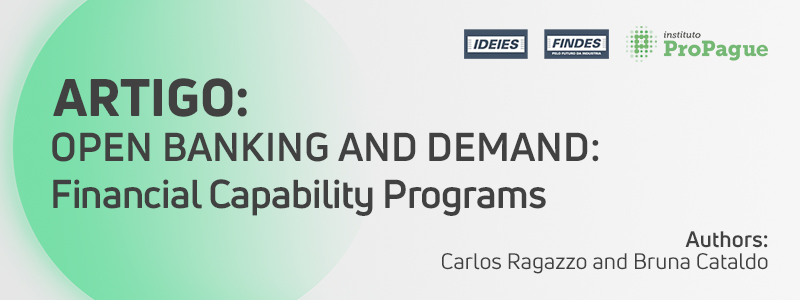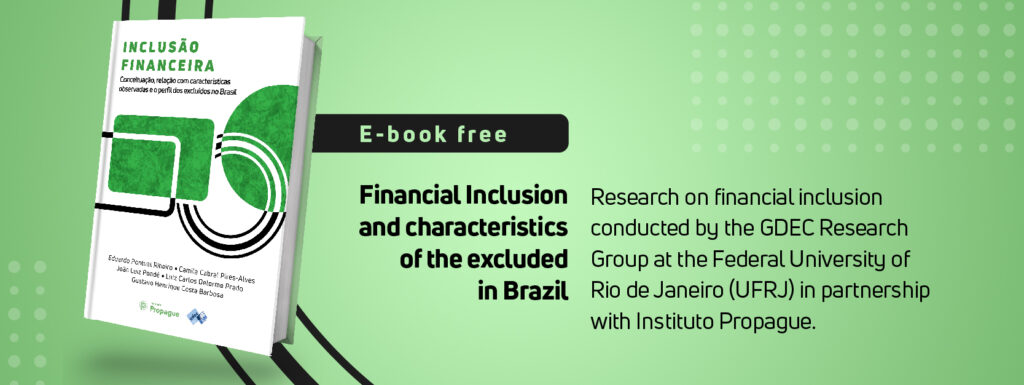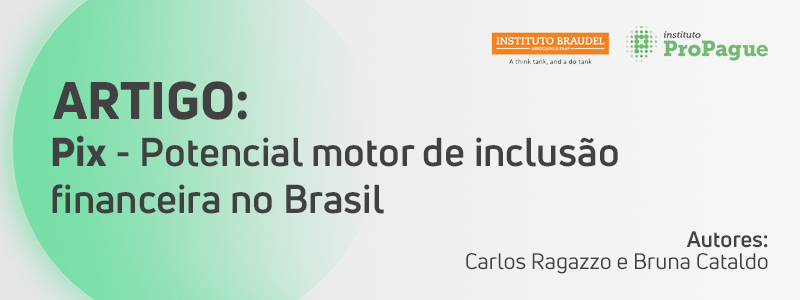Article published in Boletim Econômico Capixaba, produced by Observatório Ideies, an entity of the Findes System.
Authors: Carlos Ragazzo, professor at FGV-Rio and President of the Advisory Board at Instituto Propague and Bruna Cataldo, researcher at Instituto Propague.
The expansion of financial innovations – driven by an accelerated process of digitization and coordinated action by regulators – is a global trend happening in countries with different income profiles. Brazil figures on the frontier of regulatory developments in the financial sector, driven by the increase of Fintechs in the country throughout the last decade and by an active stance of the Central Bank with Agenda BC#. It was inspired by the path previously laid out by other regulators: the European Central Bank (ECB) – mainly through PSD2 directive, which started the Open Banking movement in the European Union – and the Reserve Bank of India (RBI) and National Payments Corporation of India (NPCI) – mainly through the creation of the UPI instant payments platform.
In particular, Open Banking aims to encourage the development of products better suited to different customer profiles by making institutions share their clients’ data upon their consent, ending the current data monopoly of large financial institutions. It will have considerable influence in the credit market due to the possibility of personalized offers. The expectation is that it will be particularly attractive to micro and small entrepreneurs, that were on the fringes of the formal financial system until now (Atkinson, 2017).
Thus, the regulatory framework enables greater competition, allowing the pluralization of financial services, which, in turn, has potential to impact financial inclusion even in the face of digitization challenges and cultural and socioeconomic barriers.
But there is an additional step/concern for this regulatory movement to achieve its real transformative potential: in addition to being included and visible to the financial system, entrepreneurs should be able to navigate it and make adequate and conscious choices. In the case of Micro and Small Enterprises (MSEs), providing entrepreneurs with financial capabilities is a fundamental principle for them to prosper and involves the combination of knowledge, skills, attitudes, and behaviors that enable them to make effective financial decisions to start, manage, and ensure the sustainability and growth of their business (OECD, 2018).
Developing financial capability also becomes especially important in the coming years due to the diversification of products that Open Banking will generate. Part of this work will come from the providers themselves, not least because a better product experience will be key to guarantee consumer engagement.
But it is necessary to discuss private and public initiatives to develop financial capabilities, so that entrepreneurs can not only seize the countless opportunities that arise from taking credit, but mainly know how to choose among a larger menu of alternatives (Atkinson, 2017).
Otherwise, there is evidence that an increase in the number of product options can be detrimental to their financial health (OECD/CAF, 2020) because if there is not enough knowledge, more credit consumption can lead to over-indebtedness rather than development (Lusardi, Tufano, 2009).
This problem extends to the whole idea of financial citizenship: people who cannot navigate the financial system properly may experience a loss of well-being by not being able to save for the future or take advantage of financing opportunities in business, spend excessively because of difficulties with budget management, among other problems.
It becomes a social issue in which the lack of financial capability can hinder the full exercise of citizenship and act as an aggravator of the dynamics that contribute to poverty and inequality. The relevance of the subject is even recognized by the Brazilian Central Bank (Banco Central, 2018), which associates the development of capabilities to the fulfillment of the conditions of financial citizenship, to which it attributes benefits in areas like individual well-being, health, poverty, equality as a whole and gender equality in particular, and stability and economic growth.
This theme is distinctively relevant in Brazil because the country’s financial capability indicators show a challenging scenario in the face of the likely opportunities that will be brought by movements such as Open Banking. In a survey conducted by the OECD to measure the financial capability of the G20 countries, Brazil scored below the average of the G20 (OECD, 2017), but also of other Latin American countries (OECD/CAF, 2020). The survey analyzes basic knowledge, skills and attitudes regarding financial aspects of life such as: day-to-day financial decision-making for oneself and one’s household, budgeting behaviors, forms of saving, financial resilience to external shocks, retirement planning, knowledge and choice of financial products, how the choice is made and what information influences it, knowledge of mathematical operation such as division, simple and compound interest, and knowledge about diversification, inflation, and the relationship between risk and reward.
Looking at country-specific indicators, only 63% of Brazilians try to make well-informed financial decisions; that is, actively seek information about a product’s important features when making a choice. Ideally, this information should be unbiased so the person can make comparisons both between products and suppliers. This involves some degree of problem solving, critical analysis and knowledge about key financial concepts, a field in which Brazil has problems. Two in five Brazilians could not answer what inflation is, only 50% can calculate an amount of principal plus interest, only 30% can calculate compound interest for a 5 year period and only 18% get both simple and compound interest questions right.
Considering the aforementioned data as a whole, Brazil’s financial knowledge indicator is 48% (OECD, 2017): that is, more than half of the population does not reach the basic knowledge score. In addition, 50% of Brazilians do not reach minimum scores for financial attitude, an indicator that measures short-term preferences that can hinder the development of improvements in financial resilience and well-being.
The problem is not unique to Brazil: despite being below the G20 average in several indicators, most countries have insufficient numbers. However, Brazil has an additional challenge, as it is one of the countries where people have shown a tendency to overestimate their financial knowledge (OECD, 2017), which can be a relevant barrier for entrepreneurs to seek qualification programs.
These data show that any intervention focused on developing the financial capability of MSEs will have to deal with the issue of basic personal financial capability, especially considering the socioeconomic profile of a large portion of the entrepreneurs behind these companies and the degree of informality of the economy.
The development of financial capacity is particularly relevant for credit acquisition, which is a significant obstacle to the development of MSEs. Financing has been identified as one of the main obstacles when opening and trying to grow a business, and one of the reasons for this difficulty is precisely the entrepreneur’s lack of individual financial capability (Atkinson, 2017). International examples of financial training programs demonstrate positive results brought about by small business initiatives.
While policy/initiative examples are not numerous, Atkinson (2017) has shown that financial capability projects increase the likelihood of loans being repaid correctly and reduce business failure rates, an experience corroborated by loans taken out by entrepreneurs in the Canadian Youth Business Foundation programs. And the same is true in developing countries: in Kenya, financial capability programs that focused specifically on MSEs generated increased revenues by improving their credit management, which had a positive, systemic impact on their loan portfolio.
In addition to specific programs, there are countries that developed informational consultation tools focused on credit. Australia, for example, has a digital platform called “Seeking Finance“, which offers material and courses to teach potential and existing entrepreneurs different ways to get financing. The material ranges from basic guides called “101 guide: reasons and options for seeking finance”, to tutorials and thematic articles with different degrees of complexity (e.g., how to apply for funding, how to value a business, how to crowdfund, how to apply for venture capital, etc.). In the United Kingdom, “UK Finance” offers training, workshops, webinars and e-learning for the group of companies it represents in the areas of credit, payments and fraud prevention, with specific guides for MSEs. It works on a subscription basis so that companies become members and can access the training.
In addition to national initiatives, the OECD and the European Commission have built financial capability frameworks targeted at MSE entrepreneurs (Bacigalupo et al., 2016; OECD, 2018). The skills matrices were developed from a best practice inventory methodology and aim to inform policy implementation, whether for national strategies, local public programs, or even private initiatives. The OECD recommends that capacity building focuses on three areas: knowledge, skills, and attitudes. With regard to the issue of credit and focusing on basic learning aimed at informal workers and MSEs, knowledge is understood to mean the entrepreneur (i) can identify how much money he needs to start the business and become operational, (ii) understands how much of the initial capital needs to come from external sources, and (iii) knows the implication of obtaining financing from different sources (including family and friends).
Basic skills to be targeted by financial capacity building initiatives include developing the ability to: (i) assess the real cost of starting a business and design concrete plans to meet those costs, (ii) be able to make informed decisions about financing, identifying costs and benefits of different options, and (iii) actively pursue different providers of financing. Finally, the program needs to focus on creating an attitude of confidence to navigate different types of financing from different types of providers.
The European Commission follows the same line, considering it necessary for entrepreneurs to be able to design a budget and use resources responsibly when at the basic level, find various sources of financing and manage the budget from these options when at the intermediate level, an define strategies to mobilize resources to make sustainable long-term plans when at the advanced level. The form of presentation changes, but the general framework of skills considered to be best practices for credit empowerment policies is the same.
Looking at how Brazil’s National Strategy for Financial Education (ENEF) relates to these diagnoses, one can see that there is room, private and public, to develop targeted capacity building initiatives to adapt it to regulatory changes currently underway, especially in light of possible greater inclusion of MSEs. The strategy brings together representatives from 8 government agencies and entities, which form the Brazilian Financial Education Forum (FBEF). The actions at ENEF consist of transversal and sectoral programs that are coordinated in a centralized manner, but executed in a decentralized one.
It is important to note that although MSEs are contemplated as a specific public for training initiatives executed at ENEF, 78% of the actions are generic, not having a specific target in terms of company size (AEF-Brasil, 2020). However, with the potential brought by Open Banking, it makes sense to focus on them, given that the appropriate skills for choosing and managing credit are not the same for an informal micro entrepreneur, the owner of a small or medium sized company and a large one. This is a point of attention, since it is to be expected that the degree of individual financial capability at the outset is also considerably disparate, making it difficult for generic interventions to benefit everyone. In addition, another important point is that the great majority of the initiatives are currently aimed at young people: 88% are aimed at the school or university community, and 58% are carried out in schools (AEF-Brasil, 2020).
The focus on future generations makes sense, but the transformational regulatory potential of Open Banking can only be achieved with specific actions for the adult population, current and potential entrepreneurs, whose difficulties with basic financial skills represent barriers to their development in the business world, with credit being one of the main challenges.
This movement can advance with ENEF’s current sectoral actions being used as reference. An example are the social technologies created to attend those who receive money from income transfer programs and retirees. The BC Citizenship program and the digital portals organized by CVM (Brazil’s capital market regulator) and Febraban (entity that represents banks) are examples (Banco Central, 2013). CVM has the “Portal do Investidor”, and Febraban the “Meu bolso em dia”. The first focuses on providing study materials about the capital market, but also has credit education handouts. The second focuses on the relationship of the entrepreneur with banking institutions in multiple areas, credit being one of them. To consider developing something similar but with greater focus on credit – along the lines of the UK and Australia – or adapting the credit handouts to the new regulatory structure are possible paths among many that can be taken by those responsible for the policy so as to encompass new regulatory developments and identify gaps that need correction. In addition to taking advantage of current policy structures, they can also rethink the implementation of their initiatives targeted at the adult audience. Currently, they indicate two focus groups for proponents of financial qualification projects: women and retirees (Banco Central, 2013). They could include entrepreneurs in the list as a way to encourage proponents to think of initiatives for them .
The regulatory changes currently underway have the power to remove historic barriers to competition in the Brazilian financial sector, opening space to reverse the structural frameworks that restrict greater economic development, especially by promoting MSEs. Given the likely scenario of price reduction and supply diversification of financial products associated with Open Banking, training initiatives will serve to potentiate this transformation, materializing the concept of financial citizenship in Brazil.
Bibliographic References:
AEF-Brasil. (2018). “Mapeamento de iniciativas de Educação financeira”. Available at: https://www.vidaedinheiro.gov.br/2-mapeamento/?doing_wp_cron=1605659263.1181330680847167968750. Date of access: 13/11/2020
Atkinson, A. (2017), “Financial Education for MSMEs and Potential Entrepreneurs”, OECD Working Papers on Finance, Insurance and Private Pensions, No. 43, http://dx.doi.org/10.1787/bb2cd70c-en.
Bacigalupo, M., Kampylis, P., Punie, Y., Van den Brande, G. (2016). EntreComp: The Entrepreneurship Competence Framework. Luxembourg: Publication Office of the European Union; EUR 27939 EN; doi:10.2791/593884.
Banco Central. 2018. Report on Financial Citizenship. Available at: https://www.bcb.gov.br/content/publications/report_fincit/Report%20on%20Financial%20Citizenship%20-%202018.pdf. Date of access: 19/11/2020
Banco Central. 2013. Brasil: implementando a Estratégia Nacional de Educação Financeira. Available at: https://www.bcb.gov.br/pre/pef/port/Estrategia_Nacional_Educacao_Financeira_ENEF.pdf. Date of access: 21/11/2020
Lusardi, A; Tufani, P. 2009. Debt Literacy, Financial Experiences, and Overindebtedness. OECD-Brazilian International Conference on Financial Education.
OECD/CAF (2020), Estrategias nacionales de inclusión y educación financiera en América Latina y el Caribe: retos de implementación. Available at: http://www.oecd.org/financial/education/Estrategias-nacionales-de-inclusi%C3%B3n-yeducaci%C3%B3n-financiera-en-America-Latina-y-el-Caribe.pdf. Date of access: 13/11/2020
OECD (2018), OECD/INFE Core competencies framework on financial literacy for MSMEs. Available at: http://www.oecd.org/finance/financial-education/OECD-INFE-core-competencies-framework-on-financial-literacy-forMSMEs.pdf. Date of access: 15/11/2020
OECD (2017), G20/OECD INFE report on adult financial literacy in G20 countries. Available at: http://www.oecd.org/daf/fin/financial-education/G20-OECD-INFE-report-adult-financial-literacy-in-G20-countries.pdf. Date of access: 16/11/2020




